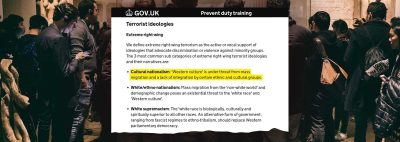The British government has now officially designated concern over mass migration and cultural integration as a potential form of terrorism.
According to the UK’s “Prevent” program—an anti-terrorism initiative ostensibly aimed at stopping radical threats before they turn violent—Britons who express alarm about the erosion of Western culture due to mass immigration may now find themselves flagged for “deradicalisation.”
The Government’s official training course for Prevent identifies “cultural nationalism” as one of three sub-categories of “Extreme right-wing terrorism.” The definition? Believing that “Western culture is under threat from mass migration and a lack of integration by certain ethnic and cultural groups.”
The other two so-called “extreme right-wing” ideologies listed by the Government include:
White/ethno-nationalism, defined as the belief that mass migration from the “non-white world” and resulting demographic shifts pose an existential threat to the “white race” and Western society as a whole.
And white supremacism, which asserts that the “white race” is inherently superior—biologically, culturally, and spiritually—to all others, and advocates for alternative forms of government, ranging from fascist regimes to ethno-tribalism.

The guidance doesn’t require incitement to violence, nor even offensive speech. It simply flags the belief that uncontrolled migration and a failure to integrate threaten the identity of Western nations. In other words, a view shared—openly or privately—by millions across Britain and Europe is now treated as a pathway to terrorism.
Is this really about preventing terrorism, or policing political thought, when you can be labelled an extremist simply for caring about your country’s cultural future?
Critics are accusing the government of weaponising counter-terrorism laws—originally designed to protect the British public from foreign threats—and turning them inward on their own citizens. All to suppress dissent on one of the most pressing political issues of our time: the transformation of Western nations under the weight of mass immigration.
“These laws were meant to protect us from dangerous ideologies coming into the UK, not to silence those of us who want to speak out against them,” said one free speech advocate. “You’re allowed to question government policies—unless those policies involve immigration. Then you’re suddenly a threat to national security.”
At the heart of this is a deeper ideological shift spreading across the Western world: secular, bureaucratic governments are increasingly positioning themselves as the ultimate authority, not only over public safety but over morality itself. For decades, people have been so focused on the “separation of church and state” that they failed to recognise a greater danger: the state’s gradual absorption of the church. Any government that refuses to acknowledge God above the state will, in time, seek to play god over its people.
As the British state expands its definition of extremism to include ordinary patriotism and cultural preservation, many fear the true danger lies not in the people expressing concern, but in the government that refuses to listen to their concerns.
What we’re witnessing is a government that’s broken loose from its God-ordained limits. When a state no longer acknowledges a higher authority, it begins to act as one. It sees itself as the sole arbiter of what is good, right, and acceptable, and it demands the kind of absolute conformity that only God can require from the people.
The Western world was a historical anomaly—one of the few civilisations in which mutual trust and respect existed between the government and the governed. For generations, citizens believed their leaders were working in their best interests. They may not have agreed on everything, but there was a basic assumption of good faith: that their elected officials were, at the very least, trying to serve the public good.
Today, that trust, built over centuries, is being steadily eroded. More and more, people feel that their governments are deaf to their concerns, even hostile toward the native population. The gap between rulers and the ruled is widening. This move only suggests that governments are increasingly viewing the average native citizen not as someone to protect, but as a potential threat.
This trajectory can only lead to deeper division and instability. And we fear the UK, among other Western nations, is now on that path, not because of the people, but because of a government that has grown dangerously distant from them. And branding a significant portion of the population as potential terrorists will not bridge that divide—it will deepen it.
Click this link for the original source of this article.
Author: Staff Writer
This content is courtesy of, and owned and copyrighted by, https://caldronpool.com and its author. This content is made available by use of the public RSS feed offered by the host site and is used for educational purposes only. If you are the author or represent the host site and would like this content removed now and in the future, please contact USSANews.com using the email address in the Contact page found in the website menu.








